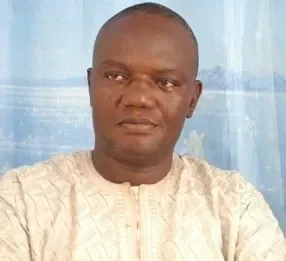By Sunny Awhefeada
Deacon Chris Iyovwaye by all standards fits the bill of a business tycoon of global reckoning with the attend razzmatazz manifesting in provocative opulence and ostentation. He has, however, chosen to tread the path of humility and philanthropy. Born in 1964, a moment of infinite promises which coincided with the creation of the defunct Midwest region just one year after Nigeria became a republic, Iyovwaye’s life reflects the zeal and phenomenal leaps in human endeavours that the moment of his birth signposted which sadly was betrayed by bad leadership. Growing up in a Nigeria that suffered the tornadoes of misrule, Iyovwaye’s path was not strewn with rose petals. He rolled up his sleeves, toiled and sweated as an auxiliary nurse and quality control inspector in a glass factory. From that humble beginning, his biodata reads: “Deacon Chris Iyovwaye has built an empire from the ground up, transforming a zero-capital venture into a multi-million dollar organization. Wellmann is a leader in heavy lifting, modular weighing and jacking systems, as well as marine and land transportation. It stands as a market leader in modular transportation across Africa. One of Wellmann’s landmark achievements includes the transportation of a 3,800 ton cargo Chevron, the largest single structure ever moved in Nigeria and Gulf of Guinea”. This excerpt speaks to the standing of Wellmann Group of Companies of which Iyovwaye is Chief Executive Officer.
Described as “a man blessed to be a blessing”, he embraced philanthropy with a rare passion offering scholarships, providing clean water to communities, building shelters, supporting businesses, supporting orphans, widows and the elderly. His desire to serve humanity finds a correlate in the ideals of the Rotary Club which he joined many years ago. Having served humanity and upheld the ideals of the Rotary, people of goodwill gathered to witniess his installation as the 47th president of the Rotary Club of Warri last Saturday. He used the occasion to inaugurate water project scheme that will provide water for twenty communities. I was invited as the guest lecturer for the occasion. What follows is the text of the lecture I presented at the ceremony.
It is my pleasure to deliver this lecture that seeks to establish a relationship linking water, humanity and the ideals of the Rotary Club. In doing this, I must begin by congratulating Rotarian Chris Iyovwaye who is being installed as the 47th President of the Rotary Club of Warri. He has as part of his vision and in tandem with the ideals of Rotary Club’s selflessness chosen to provide water for humanity. This is my justification for the title of this brief lecture, WATER, HUMANITY AND THE ROTARY IDEAL.
Since it was founded in 1905 the Rotary Club has taken on the task of making the world a better place by promoting service and community development. Its core value of “service above self” must have been intended to put humanity at the core of all that we do. And if humanity is served we would all be served and the world would be a much better place. This is also in tandem with the vision of Rotary which is to provide service to others. Among the areas of focus of Rotary is the provision of clean water and fighting diseases. An evaluation of the Rotary narrative indicates that Rotarian Iyovwaye’s installation today speaks to his altruism and untiring service to humanity. He has significantly advanced the mission of the Rotary Club in Nigeria. Looking back to the coming of the Rotary Club to Nigeria in 1961 and Warri in 1979, Rotarian Iyovwaye stands out as a standard bearer of what Rotary stands for in its entirety. I once again congratulate him.
His choice of water project must be viewed from multiple perspectives. Water is central to humanity and embedded in this centrality are spiritual, cultural, sociological and developmental imperatives which propel the holistic survival of humanity. Every civilization derives its sustainability from the availability of water. Those of us who subscribe to Christianity will know that when God created the world and put man in the Garden of Eden He also gave the Garden four rivers namely the Pishon, the Gishon, the Tigris and the Euphrates. God gave Adam and Eve four rivers and not three, two or one. Every other civilization survives by water which remains a creative force in many creation stories or myths. This is how central or significant water is to humanity.
Humanity’s space is conditioned by earth and water. Of these two, water occupies seventy-one percent (361 million sq. km), while earth has just twenty-nine percent (139 million sq. km.). This shows that water has an overwhelming presence. However, not all the volume of water is useful to humanity. Despite humanity’s phenomenal advancement in science and technology, the dependence on water remains total. Humanity survives on water through agricultural, industrial, ecological, economic, health, recreational, spiritual and most importantly domestic uses. Fela Anikulapo-Kuti, the Afro-beat musician, said it all in “water no get enemy”.
The subsisting global development agenda which is the Sustainable Development Goals (SDGs) has two out of its seventeen mandates relying on water for realization. These are:
- SDG 3: Good health and well being
- SDG 6: Clean water and sanitation
Nigeria has a Federal Ministry of Water Resources in realization of the significant role played by water. Nearly all the states of the federation also have ministries of water resources. The government pursues a water resources development policy. This oversees the wellbeing of rivers, dams, water supply, irrigation, etc. There are also River Basin Development Authorities. There was also a controversial water resources bill.
Nigeria is home to many rivers chiefly the Niger and Benue. Around us in Delta we have the magnificent Jameson River and the enchanting Ethiope River. Sapele where the Jameson and the Ethiope meet derives its name from “Urhiapele” in memorialization of the man who first settled near the river and not after Mungo Park or another European explorer who claimed to have discovered rivers our forebears used from primeval times. The Warri and Benin Rivers are also part of our aquatic experience. Then the Atlantic Ocean into which all of them flow is part of the global maritime order. Despite the abundance of water in Nigeria, there is a huge gap and need for adequate drinking water. There are still many communities that do not have access to clean and portable water in Nigeria. UNICEF tells us that 67% of Nigerians have access to drinkable water, while only 19% have access to safely managed water. This means that about 197 million Nigerians have no access to safely managed water, the kind Rotarian Iyovwaye is offering to these communities.
Rotarian Iyovwaye is offering humanity water to drink and survive. Without water humanity will not survive. Time there was when communities were founded near water bodies like streams and rivers. As human population grew and they moved away from such sources man’s ingenuity enabled him to dig or create wells from which water was fetched for different uses. Development and modernization brought humanity pipe-borne water. I drank water from rivers, streams, wells, and safely managed sources. The first pipe-borne water in Nigeria dates back to 1915 when the colonial administration established one in Lagos. Since then many towns and communities have had access to clean and portable water. But as earlier indicated there are many Nigerians who still do not have access to drinkable water. Rotarian Iyovwaye is coming to the rescue of some of these Nigerians. I congratulate the communities that will benefit from the water project. I once knew a plumber whose appellation was “Water is life”. The water project will certainly be life nourishing for these people. Let the ideals of the Rotary Club continue to prevail. Thank you, Rotarian Chris Iyovwaye.























